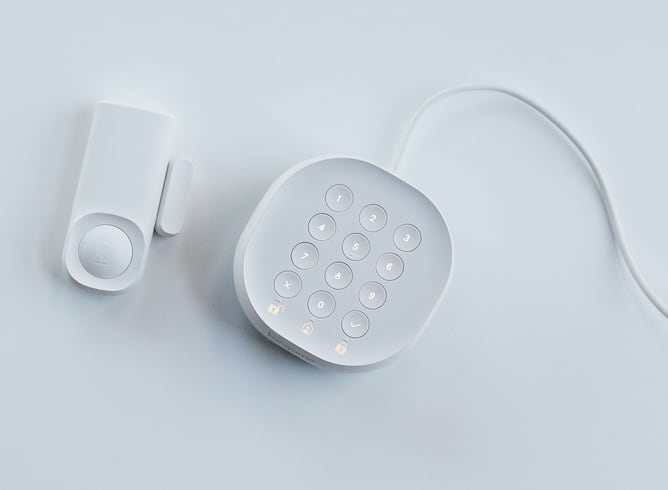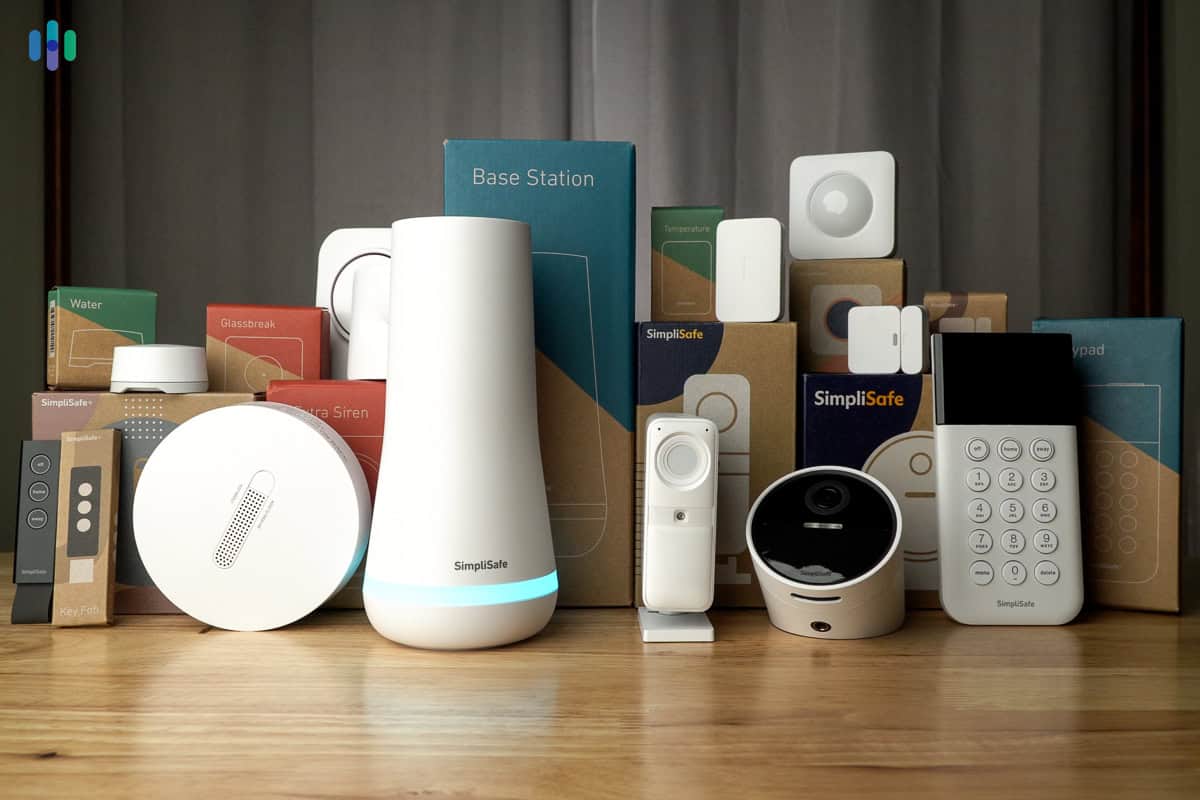Choosing something as important as a home security system can be a daunting test, especially when you hear advertisements on the daily. How can you decide which system to choose without going completely bonkers with research? Below, we’ve created an easy way to compare the best home security systems to each other, along with some helpful information on how to choose. Best of luck in your search!
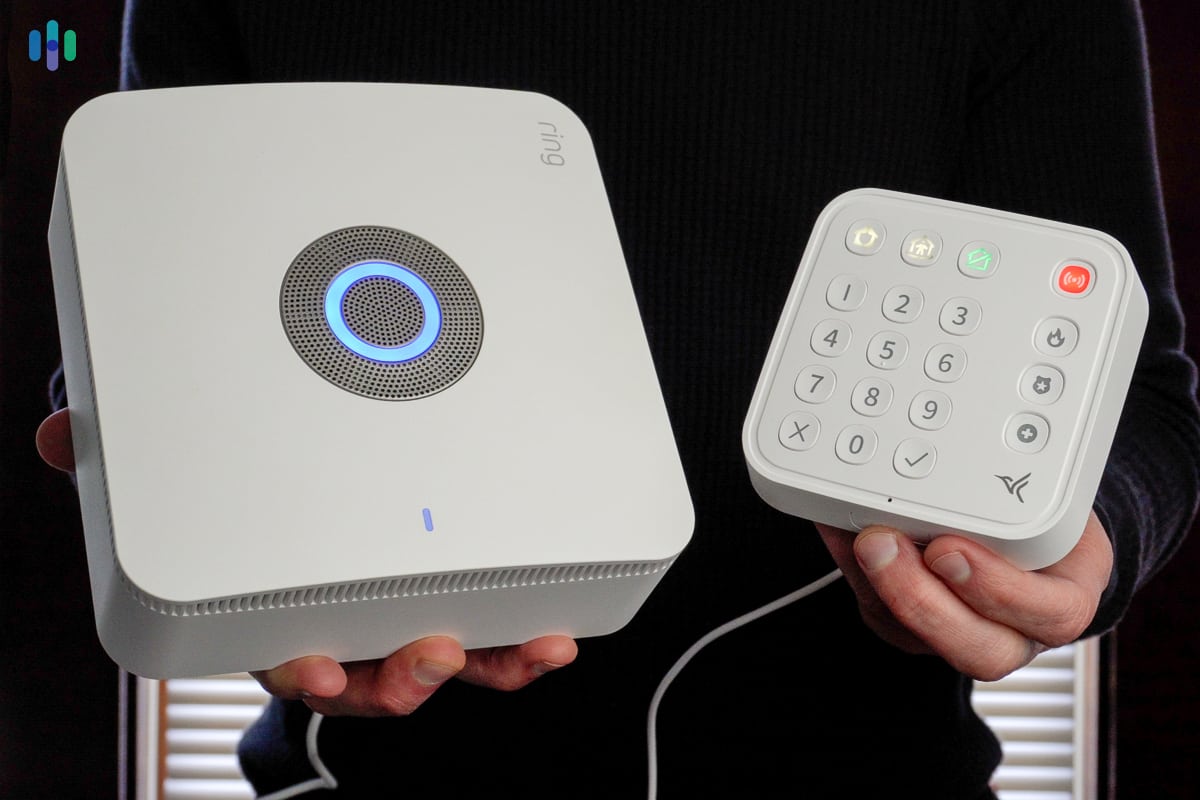
Security Systems Comparisons
Are you trying to decide between two security systems? Most of the time, comparing specs doesn’t quite cut it. The specs of a security system doesn’t show you if the touchscreen on the control panel lags or the mounting hardware loosens over time. That’s why we install all of the security systems we review in our own homes. We put the best security systems head to head comparing our experiences living with each system and then give our expert recommendations:
- ADT vs. Ackerman Security
- ADT vs. Bay Alarm
- ADT vs. Cove
- ADT vs. CPI Security
- ADT vs. Frontpoint
- ADT vs. Protection 1
- ADT vs. Ring
- Arlo vs. Lorex
- Brinks vs. ADT
- Frontpoint vs. Ring
- Nest Secure vs. Ring Alarm
- Nest vs. ADT
- Ring Alarm vs. SimpliSafe
- Ring vs. Arlo
- Ring vs. Cove
- Ring vs. Nest vs. SimpliSafe
- Ring vs. Nest
- SimpliSafe vs. abode
- SimpliSafe vs. ADT
- SimpliSafe vs. Arlo
- SimpliSafe vs. Blink
- SimpliSafe vs. eufy
- SimpliSafe vs. Frontpoint
- SimpliSafe vs. Vivint
- Vivint vs. ADT
- Vivint vs. Cove
- Vivint vs. Frontpoint
- Vivint vs. Nest Secure
- Vivint vs. Ring Alarm
- Xfinity vs. ADT
How We Set Our Standards
You might have noticed that three alarm companies make frequent appearances in our comparison pages: ADT, SimpliSafe, and Vivint. That’s because they are the highest-rated alarm companies in our book, and they are the standard with which we measure security systems to find the ones that offer the best protection. Have a look at our favorites below:
Security System Deals
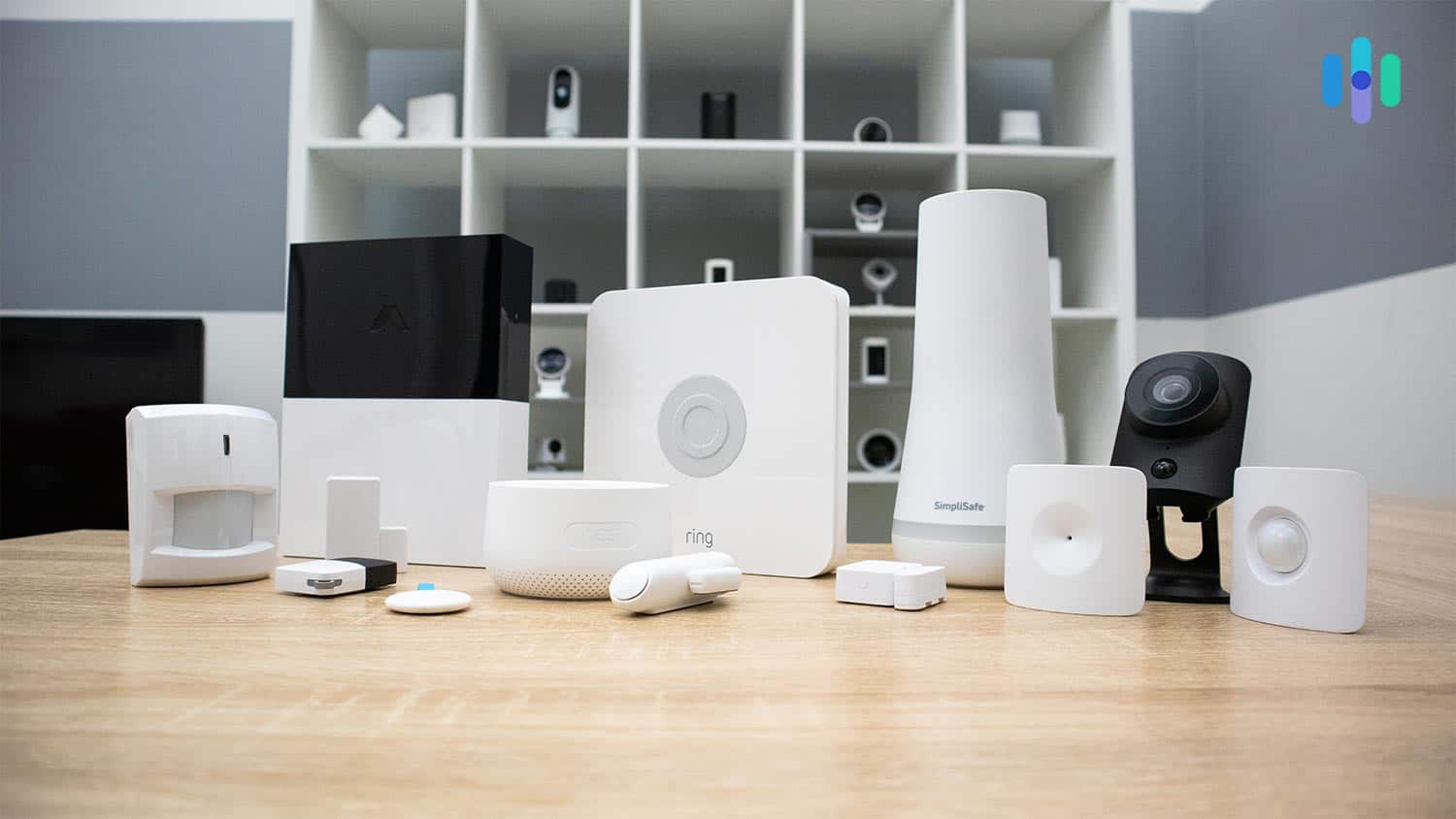
Of course, you want quality home security, but you don’t want to pay top dollar. There are home security system deals throughout the year that you can take advantage of to offset the equipment cost, and sometimes even the monthly cost of owning a security system.
General
Black Friday and Cyber Monday
- Black Friday security system deals
- ADT Black Friday deals
- Vivint Black Friday deals
- SimpliSafe Black Friday deals
- Frontpoint Black Friday deals
Prime Day
NOTE: Prime Day is a two-day sales event only available for Amazon Prime members. Prime Day 2022 kicks off on July 12 and ends on July 13.
What To Look For in a Home Security System
We get it, looking through home security systems the first time gets overwhelming quick. From monitoring options to security camera specs, there’s a lot to take in and learn. But that’s why you have us. We’ve learned the most important aspects of choosing security systems by testing over 60 of them ourselves. Here’s what we look for when helping our friends and family pick out a security system:
Type of Installation
Do you want DIY or professional installation? DIY installation has the distinct advantage of being free, while you might have to pay a fee for professional installation. These days, most DIY home security systems are pretty easy to install, especially if they’re wireless, so if you’re looking to save money, do it yourself.
Type of Monitoring
Similarly, figure out if you want self-monitoring, 24/7 professional monitoring service, or both. Again, if you’re looking to save money, you can self-monitor your system for free using its mobile app. However, for the most protection at all times, go with the professionals to get a quick response time, even if you miss the alarm notification.
Home Automation
If you already live in a smart home and are addicted to voice control, look for a smart security system that works with your existing smart home devices. Also, so you don’t have to switch between voice assistants, look for an Alexa security system or a Google Home security system, depending on what you already have set up. With compatible IoT devices, you’ll be well on your way to home automation.
Equipment
What equipment will you need, and how much do you need? Take these factors into account:
- Where your equipment will go: You may be installing your security system in a garage, or looking for a large home security system, apartment security system, or vacation home security system. Decide what you need for your space.
- Wired vs. wireless: Next, choose wireless home security, hardwired home security, or a combination of the two. And yes, wireless security systems can be reliable.
- Components: Finally, decide what components you’ll need, such as security cameras, video doorbells, smart door locks, and various sensors like motion sensors, glass break sensors, window sensors, and door sensors. You can also add smart lights to make it seem like you’re home when you’re not. Learn more about the best smart locks as well.
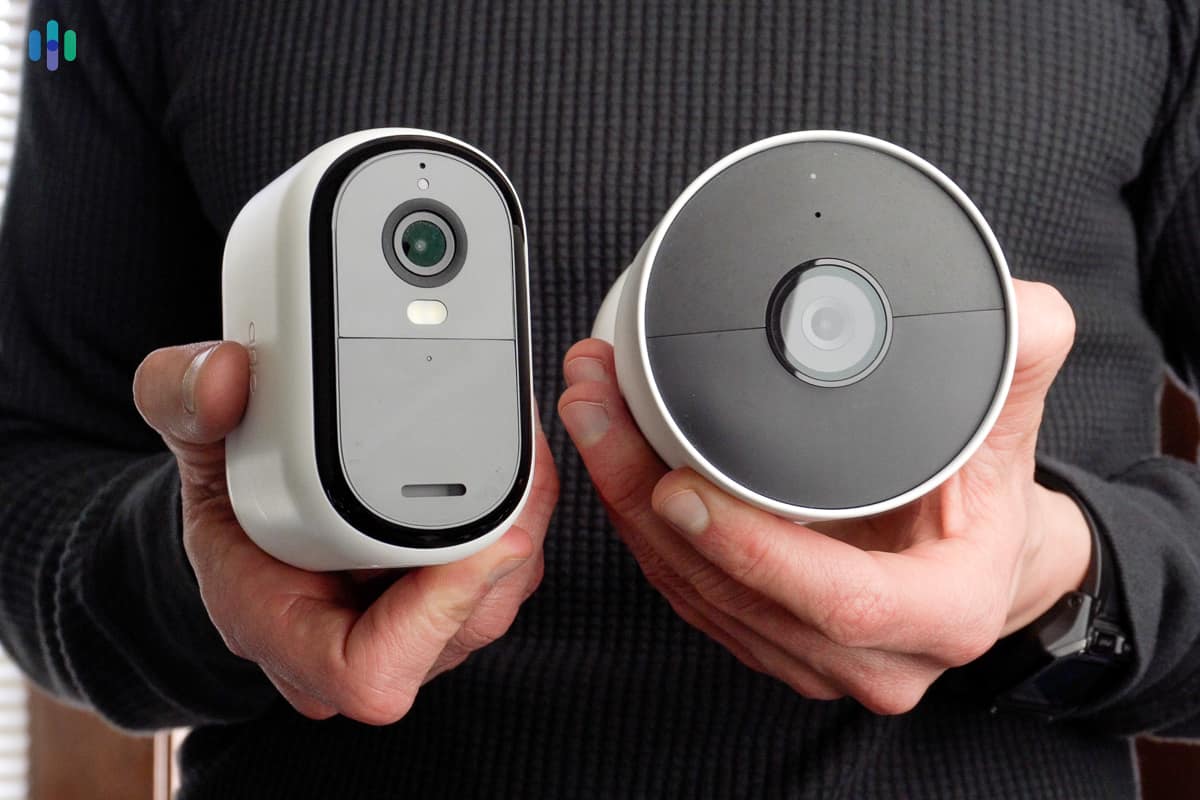
Backup
Many Wi-Fi-connected security systems come with some form of backup so that they can stay connected to the professional monitoring center. You may want a cellular security system, a landline security system, or a no-landline security system. Since most people don’t have landlines anymore, there are many security systems that don’t require landlines.
App
Look for a security system with a strong app on either iOS or Android, depending on your mobile device. Check the app’s reviews in the App Store or Google Play Store. If it’s rated above three stars, chances are that it works well.
Customer Support
Customer support should be available over the phone, live chat, and email, with a helpful selection of user guides and FAQs.
Pricing
Of course, you can’t forget to consider the bottom line, your home security budget. From equipment to monitoring fees, there are many factors to take into account, so come up with a budget before you start shopping. But let’s break down the cost of home security even further.
Security System Finder
By answering a handful of easy questions, you can discover the security system that’s perfectly tailored to your needs!

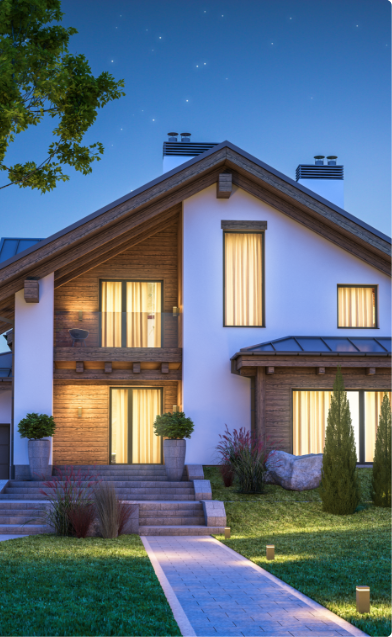
How Much Do Security Systems Cost?
Security systems can cost as little as $30 for three entry sensors for your ground-floor windows, up to thousands of dollars for larger homes. But equipment isn’t the only cost you might incur; we’ve listed them all below.
- Activation fee: These days, activation fees are rare, but some companies do require a small fee to activate your security system.
- Storage: If you have a security camera, you may have to pay a monthly or yearly fee for cloud storage, although in most cases, cloud storage is included in the professional monitoring subscription.
- Installation: Professional installation usually comes at a price of around $100, but you may need to pay more depending on the equipment being installed. Of course, if the security system allows DIY installation, you can skip this cost by installing your system yourself.
- Equipment: Equipment is the bare minimum when it comes to home security costs. Again, it can range from under $100 to thousands of dollars, depending on the size of your home and how much protection you want. On average, a basic home security system costs $200 to $300.
TIP: If you want to minimize your equipment costs, only buy entry sensors for the doors and windows on your ground floor, as these points are where burglars are most likely to enter.
- Monitoring plan: Another optional cost is monitoring. If you go with 24/7 professional monitoring, you’ll pay either monthly or yearly, whereas self-monitoring is typically free. For professional monitoring, the cost ranges from $10 to $60 a month.
- Cancellation: If you sign a long-term as opposed to a month-to-month contract, you may have to pay a fee to cancel your home security.
- Permits: Depending on where you live, you may have to buy a permit for your home security, which usually costs around $50 to $100.
Some companies also make you pay more for livestreaming, remote control (which lets you arm and disarm your system from anywhere, not just a physical control panel), and smart platform integrations, but they typically include these services for free. So, if you want to save money, look for a DIY, self-monitored system with free cloud storage. That way, you’ll only have to pay for equipment.
Do I Need a Home Security System?
After reading about all those potential costs, you may be wondering if you really need a home security system. We think that anyone living in a building without physical security guards could use a home security system to secure your home and protect your home from invasions, but if you don’t believe us, weigh the pros and cons below.
Pros
- More safety: Did you know that most burglars enter homes through doors1 and windows?2 Even just installing entry sensors could make a huge difference in the security of your home.
- Home insurance discount: Installing a home security system could get you a discount on your homeowners insurance (but you’re unlikely to get a tax deduction for your security system).
- Crime prevention: Aside from letting you know the moment when break-ins happen, security systems and cameras actually deter crime. A survey of over 400 convicted burglars, compiled by the University of North Carolina, found that burglars decided which houses to rob based partly on signs of increased security — alarm systems, outdoor cameras, and the like. In fact, if they saw alarms, 83 percent of burglars would choose another home, and if they found alarms mid-burglary, only 13 percent would continue with the attempt.3 Even a security sign can lower your chances of being burgled!
Cons
- Costs: Of course, alarm systems come at a cost, as we’ve detailed above. With the cost of the equipment itself, the monthly or yearly monitoring fees, and the storage fees, you can add home security to your ever-growing list of bills.
- False alarms: Security systems aren’t perfect. Sometimes, you’ll receive false alarms due to faulty equipment, low batteries, incorrect installation, insects, etc.4 Of course, with the correct maintenance, you shouldn’t run into too many false alarms.
Can Home Security Systems Be Hacked?
You may have seen news of home security systems being hacked. Can something that’s supposed to protect you put you at greater risk of attack?
The truth is that anything connected to the internet can be hacked, so that includes all smart security systems. Of course, if you add two- or multi-factor authentication and strong passwords to your mobile app, you can greatly reduce your risk of being hacked. Learn more digital security tips.
Home Security Statistics
We love a good statistic, but surprisingly, there’s not that much data on home security in the U.S. However, we’ve compiled the best research available as of this writing.
- According to the FBI Crime Data Explorer, burglary rates remained roughly the same in 2021 and 2022. But that’s after burglary rates were cut in half between 2012 and 2020.
- Burglaries make up an estimated 14 percent of all property crimes as of the latest update to the FBI Crime Data Explorer.
- 56 percent of burglaries involved forcible entry.
- As of 2019, the average loss per burglary was $2,661.5
- Most burglaries occur between 10 a.m. and 3 p.m., when most homes are empty.
- The months with the highest burglary rates are July and August.6
- In 2019, only 0.82 percent of U.S. households experienced burglaries.7
Home Security Reviews
Want to dive deeper into a specific security system? Well, we’ve probably tested it ourselves. Read one of our reviews of security systems we’ve personally tested below.
Recap
There you have it, everything you need to know about comparing home security systems. From understanding different monitoring options to comparing security system apps, we’ve covered the main points we look at during our security system tests. While we test out systems for months, we know you can’t when you want to compare two systems. That’s why we detail our experiences so you can make more informed decisions when it comes to your home’s security.
Want to learn more about home security systems and how to get the most out of the one that you choose? Check out our complete guide to home security systems, or keep reading for answers to some common questions.
FAQs
Home security never sleeps, and neither do we. We get a barrage of questions on how to secure your home, and we’ve answered the most common ones here.
-
What is the best home security company?
The best home security company right now is ADT. It has been in business for over a century, and it continues to uphold a trustworthy reputation in keeping homes safe. Currently, ADT offers a wide range of security systems for all kinds of homes, whether you have a landline or not. ADT is also impressive at keeping up with technology, as its security systems work with smart home platforms including Alexa and Google Assistant.
-
What is the best home security system with no monthly fee?
The best home security system with no monthly fee is SimpliSafe. Without paying for anything other than equipment, we could see what was happening at home anytime through the SimpliSafe iOS or Android app.
-
Is Ring better than ADT?
No, Ring is not better than ADT. Although Ring is more affordable and has more camera and doorbell camera options, ADT is a more trustworthy company, with over 140 years in business. Ring, on the other hand, is known for multiple privacy issues, including camera hackings, partnerships with police departments, and Amazon employees listening to Alexa recordings.
-
Is SimpliSafe easily hacked?
Although it’s been hacked in the past, SimpliSafe is not easy to hack. No SimpliSafe customers have reported being hacked, and the only hacking that happened was to the original SimpliSafe system by a senior security consultant. SimpliSafe’s new system has end-to-end encrypted communication, with frequent software updates over the air so issues can be patched as soon as possible.
-
Are there bad home security systems?
Unfortunately, there are a handful of security systems you should absolutely avoid. They experience issues that can compromise your home’s security instead of enhance it, like security cameras prone to hacking.






